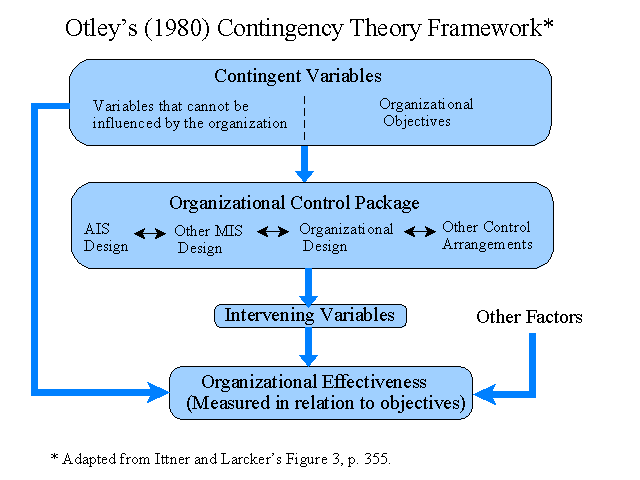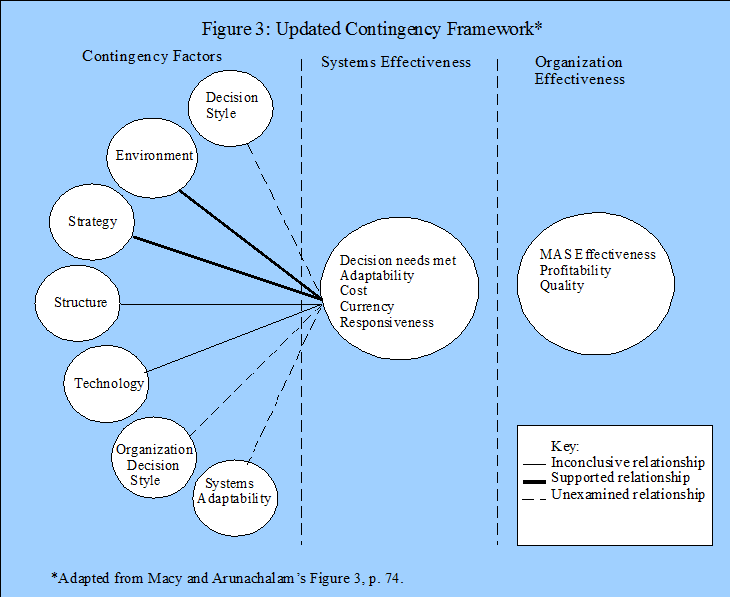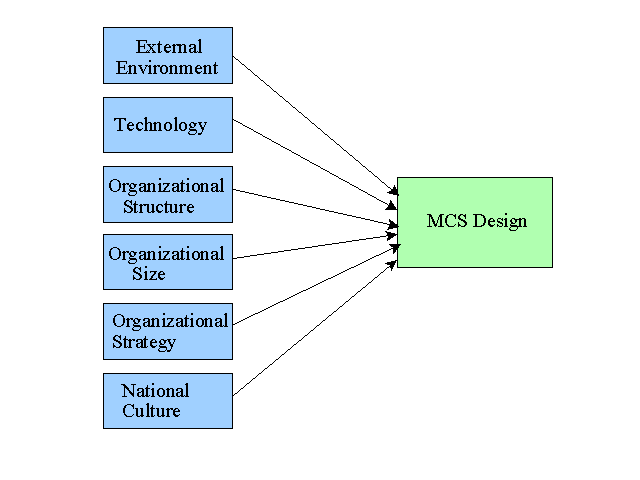
Provided by James R. Martin, Ph.D., CMA
Professor Emeritus, University of South Florida
Contingency Theory Main | Theories Main Page
Original View of Contingency Theory from Otley 1980 in Ittner & Larcker 2001.
The following graphic illustrates Otley's original (1980) view of contingency theory 1 .

An Expanded View of Contingency Theory from the Tiessen & Waterhouse 1983.
An expanded view of contingency theory is that the structure of an organization depends on the company's technology and environment and the effectiveness of the management accounting system is contingent on the organization's structure.
The location of information in relation to technology and environment has an important influence on organization structure. In uncertain environments with non-routine technology, information is frequently internal. Where environments are certain, or where technology is routine, information is external.
The dimensions of structure and control include authority structure and activities structure, i.e., rules and procedures that determine the discretion of individuals. Authority relates to social power. In the contingency model, decentralized authority is more appropriate where uncertain environments or non-routine technology exist. Centralized authority is more appropriate when environments are certain. The graphic illustration below reflects my interpretation of these theoretical concepts.

Updated Contingency Framework from Macy and Arunachalam 1995.
To expand the framework, the authors include systems change (adaptability) and organizational decision making as processes instead of factors. Figure 3 illustrates the updated contingency framework and highlights the various relationships that have been studied in prior research. The relationships between decision style, systems adaptability and organizational decision style have yet to be examined and represent opportunities for future research.

The Functionalist View of Contingency Theory from the Chenhall 2003.
Chenhall discusses contingency theories from a functionalist perspective where the assumption is that management control systems are developed, or adopted to aid in achieving desired organizational goals and outcomes. The appropriate management accounting system is contingent on the external environment, technology, organizational structure, organizational size, organizational strategy and national culture. The graphic below illustrates this functionalist perspective.

For more on contingency theory see the summaries below.
______________________________________________
1 Otley, D. T. 1980. The contingency theory of management accounting: Achievement and prognosis. Accounting, Organizations and Society 5(4): 413-428.
Related summaries:
Chenhall, R. H. 2003. Management control system design within its organizational context: Findings from contingency-based research and directions for the future. Accounting, Organizations and Society 28(2-3): 127-168. (Summary).
Covaleski, M. A., M. W. Dirsmith and S. Samuel. 1996. Managerial accounting research: The contributions of organizational and sociological theories. Journal of Management Accounting Research (8): 1-35. (Summary).
Ittner, C. D. and D. F. Larcker. 2001. Assessing empirical research in managerial accounting: A value-based management perspective. Journal of Accounting and Economics (December): 349-410. (Summary).
Kaplan, S. E. and J. T. Mackey. 1992. An examination of the association between organizational design factors and the use of accounting information for managerial performance evaluation. Journal of Management Accounting Research (4): 116-130. (Summary).
Langfield-Smith, K. 1997. Management control systems and strategy: A critical review. Accounting, Organizations and Society 22(2): 207-232. (Summary).
Libby, T. and J. H. Waterhouse. 1996. Predicting change in management accounting systems. Journal of Management Accounting Research (8): 137-150. (Summary).
Macy, G. and V. Arunachalam 1995. Management accounting systems and contingency theory: In Search of effective systems. Advances in Management Accounting (4): 63-86. (Summary).
Neimark, M. and T. Tinker. 1986. The social construction of management control systems. Accounting, Organizations and Society 11(4-5): 369-395. (Summary).
Sim, K. L. and L. N. Killough. 1998. The performance effects of complementarities between manufacturing practices and management accounting systems. Journal of Management Accounting Research (10): 325-346. (Summary).
Tiessen, P. and J. H. Waterhouse. 1983. Towards a descriptive theory of management accounting. Accounting, Organizations and Society 8(2-3): 251-267. (Summary).